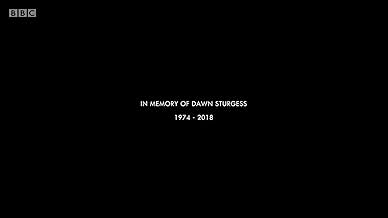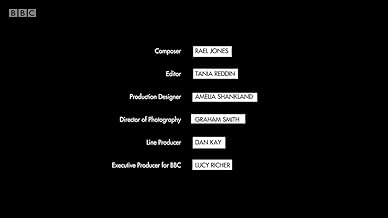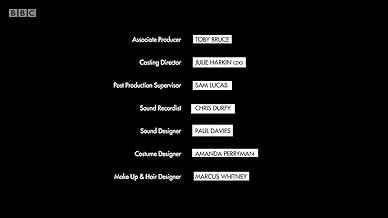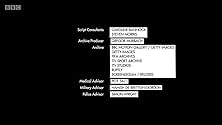IMDb RATING
7.2/10
7.6K
YOUR RATING
Three episode, fact based drama from the BBC, about the 2018 Novichok poisoning crisis in the city of Salisbury.Three episode, fact based drama from the BBC, about the 2018 Novichok poisoning crisis in the city of Salisbury.Three episode, fact based drama from the BBC, about the 2018 Novichok poisoning crisis in the city of Salisbury.
- Awards
- 3 nominations total
Browse episodes
Featured reviews
This event drew my attention when it happened and I eagerly followed this story, as I had once lived in Salisbury, but not this one. It is pleasing to see that the BBC made a mini-series of this dastardly deed and it certainly filled all the gaps, which were never disclosed in news bulletins.
The production is well done making a thrilling exposé of the happenings and aftermath. A dramatic event well worth seeing to realize that the world is still not a safe place to live in. This event took place just 2 years ago, but the investigation only concluded in 2019.
The production is well done making a thrilling exposé of the happenings and aftermath. A dramatic event well worth seeing to realize that the world is still not a safe place to live in. This event took place just 2 years ago, but the investigation only concluded in 2019.
In the main I enjoyed this drama. My only problem with it is the problem I have with many TV dramas, and that is that it was overly dramatic and at times overacted. Too many scenes of Anne-Marie Duff and her obnoxious son which didn't drive the narrative beyond that she was working hard and wasn't home as much as usual. In fact there were too many scenes of character's home lives and not enough of the police investigation in general. The dialogue was at times unconvincing and unnatural too. I'm sure everyone who worked on the case at the time found it draining at times, but the writer turned up the misery on everyone's faces to 11 and for me that's just lazy and not at all like real life at all. They could have cut out about 1 hour of the over sentimental nonsense and made it a really good watch, but they didn't hence 7 stars from me.
I let this three-part BBC series pass me by when it aired over the summer of 2020, but its appearance on the Guardian's top 50 shows of the year led me to download it. Like much of the country, I remember the initial incident very well, but the secondary victim's story - as well as the specific response to the incident were interesting to learn about.
A Russian double agent, Sergei Skripal (Wayne Swann) and his daughter Yulia (Jill Winternitz) fall suddenly and violently ill on a park bench in the small English Cathedral City of Salisbury. When the identity of the victims become known, the police begin an immediate enquiry and Detective Nick Bailey (Rafe Spall) leads an investigation of the Skripal home. It's later discovered that the pair have been exposed to Novichok, a manmade and very lethal nerve agent and stringent efforts are made immediately to limit the potential exposure of the general public, led by Tracy Daszkiewicz (Anne Marie-Duff) the Director of Public safety for Wiltshire.
The docudrama really presents the details of the incident on quite an intimate scale. The Skripal's themselves are rarely seen and the alleged perpetrators only briefly in news footage, the 'why' of the attack is not explored. Instead we follow Nick Bailey through his exposure and reaction to the nerve agent, his time in hospital, the effect on his family, and then the survivors guilt he suffers. It's all nicely played by Rafe Spall and Annabel Scholey. We follow Tracy Daszkiewicz as she is pulled into the situation, sacrificing her family time to try and keep the city safe, often offering a lone argument for expanding safety measures against opposing government priorities. Then we follow the sad case of Dawn Sturgess, a mother played by Myanna Burning, whose boyfriend accidentally exposes her to the delivery mechanism for Novichok and who can't survive the dosage. We see the impact this has on her family.
Much of the macro story is going to be classified for quite a while still, so complaints about that not being there, whilst I agree would have made for a better show, are missing the point somewhat. I'd agree with the reviews that suggested that just two episodes and less repetition, particularly of the family lives, would have made for a better series, but performances are good across the board in what is occasionally a tough watch, about everyday heroism.
A Russian double agent, Sergei Skripal (Wayne Swann) and his daughter Yulia (Jill Winternitz) fall suddenly and violently ill on a park bench in the small English Cathedral City of Salisbury. When the identity of the victims become known, the police begin an immediate enquiry and Detective Nick Bailey (Rafe Spall) leads an investigation of the Skripal home. It's later discovered that the pair have been exposed to Novichok, a manmade and very lethal nerve agent and stringent efforts are made immediately to limit the potential exposure of the general public, led by Tracy Daszkiewicz (Anne Marie-Duff) the Director of Public safety for Wiltshire.
The docudrama really presents the details of the incident on quite an intimate scale. The Skripal's themselves are rarely seen and the alleged perpetrators only briefly in news footage, the 'why' of the attack is not explored. Instead we follow Nick Bailey through his exposure and reaction to the nerve agent, his time in hospital, the effect on his family, and then the survivors guilt he suffers. It's all nicely played by Rafe Spall and Annabel Scholey. We follow Tracy Daszkiewicz as she is pulled into the situation, sacrificing her family time to try and keep the city safe, often offering a lone argument for expanding safety measures against opposing government priorities. Then we follow the sad case of Dawn Sturgess, a mother played by Myanna Burning, whose boyfriend accidentally exposes her to the delivery mechanism for Novichok and who can't survive the dosage. We see the impact this has on her family.
Much of the macro story is going to be classified for quite a while still, so complaints about that not being there, whilst I agree would have made for a better show, are missing the point somewhat. I'd agree with the reviews that suggested that just two episodes and less repetition, particularly of the family lives, would have made for a better series, but performances are good across the board in what is occasionally a tough watch, about everyday heroism.
STAR RATING: ***** Saturday Night **** Friday Night *** Friday Morning ** Sunday Night * Monday Morning
In March of 2018, in the small town of Salisbury in Wiltshire, two Russian spies unleashed a deadly Novichok nerve agent, plunging the town in to a lockdown. Tracey Daszkiewicz (Anne-Marie Duff), the recently appointed local director of Public Health, is thrust in to the spotlight, taking tough decisions in the best interest of her local neighbours and friends, including local DS Nick Bailey (Rafe Spall) who is badly struck down with poisoning, while the situation takes its toll on her home life with her family.
For just under two years now, the whole of the country (and indeed the world) has been forced to adapt to a new way of life, in order to combat the outbreak of a deadly virus, but a couple of years before, in a small town in Wiltshire, a local community was forced to adapt their behaviour to control a situation contained only for them. Even if most of us didn't have to live through it, with the events of the last couple of years, there is at least now a sad air of relatability with this dramatisation of the time by director Saul Dibb.
Initially, in the first episode, Dibb goes for a minimalist, less is more approach, capturing the unfolding events in a docu-drama style fashion, presenting normal, everyday people going about their everyday lives, dealing with their individual problems and dramas, before being thrust in to a major crisis completely out of their control. While this does give it a realistic, outside world feel, it comes at the expense of any real effective character development, leaving us less able to relate and empathise with the characters as we should. He matches the mood and tone of the drama throughout with some appropriate dull, grey lighting, but is less consistent with the character portrayals, which by the second episode have become more screechy and melodramatic.
It's flaws sadly keep it from being the sum of its parts, but it's still elevated by what it gets right, along with some strong, raw lead and supporting performances. ***
In March of 2018, in the small town of Salisbury in Wiltshire, two Russian spies unleashed a deadly Novichok nerve agent, plunging the town in to a lockdown. Tracey Daszkiewicz (Anne-Marie Duff), the recently appointed local director of Public Health, is thrust in to the spotlight, taking tough decisions in the best interest of her local neighbours and friends, including local DS Nick Bailey (Rafe Spall) who is badly struck down with poisoning, while the situation takes its toll on her home life with her family.
For just under two years now, the whole of the country (and indeed the world) has been forced to adapt to a new way of life, in order to combat the outbreak of a deadly virus, but a couple of years before, in a small town in Wiltshire, a local community was forced to adapt their behaviour to control a situation contained only for them. Even if most of us didn't have to live through it, with the events of the last couple of years, there is at least now a sad air of relatability with this dramatisation of the time by director Saul Dibb.
Initially, in the first episode, Dibb goes for a minimalist, less is more approach, capturing the unfolding events in a docu-drama style fashion, presenting normal, everyday people going about their everyday lives, dealing with their individual problems and dramas, before being thrust in to a major crisis completely out of their control. While this does give it a realistic, outside world feel, it comes at the expense of any real effective character development, leaving us less able to relate and empathise with the characters as we should. He matches the mood and tone of the drama throughout with some appropriate dull, grey lighting, but is less consistent with the character portrayals, which by the second episode have become more screechy and melodramatic.
It's flaws sadly keep it from being the sum of its parts, but it's still elevated by what it gets right, along with some strong, raw lead and supporting performances. ***
I know from local newspaper articles that many people in Salisbury felt that the showing of this docu-drama was too soon after the event. That it would rake over old coals and put our city once again in a bad light. We'll for me it didn't.
For those looking for a hard-hitting insight into how and why the Russians attempted what they did or why the suspects have never been charged then go watch the news specials that came out at the time. But for a view of how the real people at the heart of this whole affair were really affected then the writers, directors and actors have done a good job.
Yes, it is low key in its look and feel. Yes, there are a lot of people who know Salisbury thinking 'that's not somewhere I recognise'; the use of locations from other cathedral cities threw me off the narrative a couple of times wondering where the characters were meant to be. But most importantly it drew me in to understanding more of how just frightening the possible outcome of not having an early intervention could have been and the emotional strain on those key families.
For you 1 star reviewers I say your expectations were skewed from the start. It was good to see what felt like a truthful docu-drama.
And as my son said at the end of part 3, 'well, that was emotional.'
For those looking for a hard-hitting insight into how and why the Russians attempted what they did or why the suspects have never been charged then go watch the news specials that came out at the time. But for a view of how the real people at the heart of this whole affair were really affected then the writers, directors and actors have done a good job.
Yes, it is low key in its look and feel. Yes, there are a lot of people who know Salisbury thinking 'that's not somewhere I recognise'; the use of locations from other cathedral cities threw me off the narrative a couple of times wondering where the characters were meant to be. But most importantly it drew me in to understanding more of how just frightening the possible outcome of not having an early intervention could have been and the emotional strain on those key families.
For you 1 star reviewers I say your expectations were skewed from the start. It was good to see what felt like a truthful docu-drama.
And as my son said at the end of part 3, 'well, that was emotional.'
Did you know
- TriviaFeatures some real-life footage of events that occurred in Salisbury at the time, but not all city scenes were filmed in Salisbury
- Crazy creditsIn the closing credits, the names of cast and crew (but not the corresponding character names or job titles) were all shown in inverse video: black text on rectangular white backgrounds.
- Alternate versionsUpon its initial airing on BBC One, the series was presented in three hour-long episodes. In every other territory, it was re-edited into four 45 minute-long episodes. Thus the 1st episode of the four part version covers events of the 1st episode of the BBC version, the 2nd covers the rest of the 1st BBC with some of the 2nd, the 3rd the rest of the 2nd BBC with some of the 3rd and the 4th the rest of the 3rd BBC.
- How many seasons does The Salisbury Poisonings have?Powered by Alexa
Details
- Release date
- Country of origin
- Official sites
- Language
- Also known as
- Отруєння в Солсбері
- Production companies
- See more company credits at IMDbPro
- Runtime58 minutes
- Color
- Sound mix
- Aspect ratio
- 2.00 : 1
Contribute to this page
Suggest an edit or add missing content






![Trailer [OV]](https://m.media-amazon.com/images/M/MV5BZWYzNzg3NjUtYWY5NC00ODlmLTlkOGUtNGVlZWM0OTk4Zjg2XkEyXkFqcGdeQXRyYW5zY29kZS13b3JrZmxvdw@@._V1_QL75_UX500_CR0)

































